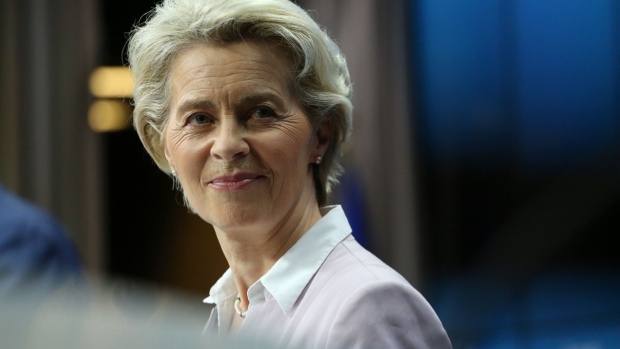Jun 26, 2024
EU Leaders Set to Pick Von der Leyen as Bloc’s Executive Chief
, Bloomberg News

(Bloomberg) -- European Union leaders nominated Ursula von der Leyen for a second term as president of the bloc’s executive arm, as part of an agreement on top jobs for the next five-year mandate.
The deal includes the election of former Portuguese Prime Minister Antonio Costa as head of the European Council and Estonian Prime Minister Kaja Kallas as the EU’s high representative for foreign affairs and security.
Von der Leyen’s nomination still needs to be confirmed by the European Parliament, where she may struggle to win a majority of votes.
“I will work with the whole parliament,” von der Leyen told reporters afterwards. “For me, it’s about convincing about a broader majority for Europe.”
Her approval there “is not a given of course,” Valerie Hayer, a French lawmaker who leads the Renew Europe group, told reporters on Thursday, adding that ahead of the vote von der Leyen will be subject to a grilling from EU parliamentary parties on topics ranging from defense and competitiveness to the rule of law.
Von der Leyen was confirmed for her last term by the narrowest margin in the EU’s history — and this time, the math may be even trickier.
The decision on top jobs comes after EU leaders fell short of a deal last week. Some, particularly Italian Prime Minister Giorgia Meloni, have expressed frustration that closed-door negotiations between the center-right European People’s Party, the socialists and the liberals didn’t reflect the heft of a far-right whose numbers had been boosted by the recent elections.
Meloni kept her cards close to her chest and ignored calls from several leaders in the run-up to the summit, according to two diplomats who requested anonymity when discussing a private matter. She abstained on von der Leyen’s appointment and voted against Kallas and Costa, according to diplomats who spoke on condition of anonymity to discuss sensitive negotiations.
Meloni told reporters after the vote that the process showed “above all a lack of respect for EU citizens.” She added, “I think that Italy needs to make its weight count. We have done it. Italy will get what it deserves.”
Meloni’s allies are currently set to form the third-largest bloc in the parliament, but deliberations on those groupings still continue.
The support of the three centrist groups may still be insufficient for von der Leyen’s confirmation vote in the parliament, expected in mid-July, and she could need the backing of others. There is still ill will in the chamber over the manner of her last appointment, which upended the traditional selection process.
Read Bloomberg’s Profile of Ursula von der Leyen Here
Von der Leyen had been seen as the front-runner after five years in which her handling of the Covid pandemic and the fallout from Russia’s invasion of Ukraine gave her a reputation as a competent manager. She received criticism for rushing to support Israel in the aftermath of Hamas’s terrorist attacks and for keeping the control of her commission tightly centralized.
Costa, a socialist candidate with wide support across parties, will take over from Charles Michel later this year to head the body that convenes EU leaders. He resigned as his country’s prime minister last November following allegations of influence-peddling, but the case in Portugal has lost momentum.
Meanwhile, Kallas finally convinced some nations with misgivings that her focus on the threat of Russian aggression came at the expense of other concerns, and had been reluctant to approve the liberal as the EU’s top diplomat. In a tweet she called her new role “an enormous responsibility at the moment of geopolitical tensions.”
The three candidates were seen as the likely options for weeks, with negotiations going smoother than in previous occasions. Some leaders including French President Emmanuel Macron, however, had explored alternatives for the commission chief, including former Italian Prime Minister Mario Draghi.
The distribution of the EU’s top jobs was decided among the largest political families based on the results of elections held on June 6-9. The leaders also aimed to achieve a geographical and gender balance.
--With assistance from Andrea Palasciano, Jorge Valero, Samy Adghirni, Donato Paolo Mancini, Milda Seputyte, Kevin Whitelaw, Lyubov Pronina, Michael Nienaber, Natalia Drozdiak, Zoltan Simon, Piotr Skolimowski, Olivia Fletcher, Sanne Wass and Max Ramsay.
(Updates with quotes from von der Leyen, Meloni starting in fourth paragraph)
©2024 Bloomberg L.P.







